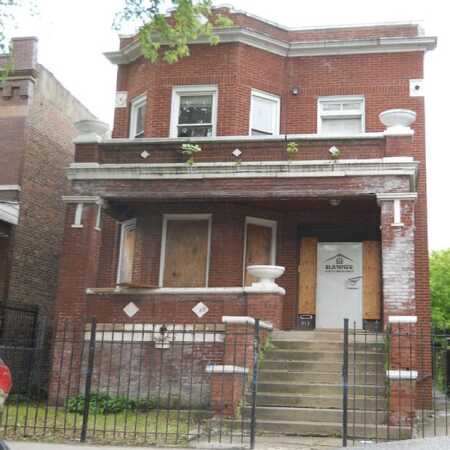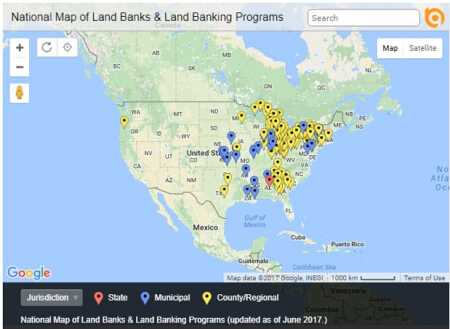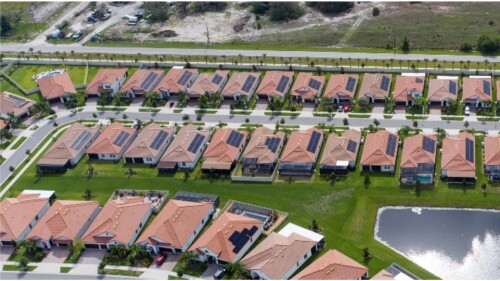For more than a decade, the brick “two-flat” on the 900 block of North Drake Avenue on Chicago’s West Side had been vacant. During the housing boom, a contractor began converting the building, a two-story detached home with two separate apartments and a basement, into a three-unit condominium, with plans to develop the basement level into a garden unit. But the job was never finished, the property was abandoned, and the condo units fell into foreclosure.
Neighbors said the property became a hangout for heroin addicts, evidenced by the needles strewn in the yard and under the back porch. Residents called police regularly to report issues, and the neglected building had a variety of safety problems and structural concerns.
But by the time the school year begins this fall, the West Humboldt Park home will have a new occupant. A first-time homeowner plans to move in after renovations are completed, says John Groene, neighborhood director of the West Humboldt Park office of Neighborhood Housing Services (NHS) of Chicago, a nonprofit neighborhood revitalization organization. The homeowner plans to live on one floor and rent out the other.
The change will have an immediate impact on the block. “Vacant buildings, if nothing else, are magnets for crime. There is crime in some blocks in Chicago only because there are vacant buildings that make it attractive for crime to happen there,” Groene says.
A major reason for this property’s happy ending is the involvement of a land bank that acquired the building and wiped out its back taxes and encumbrances, making it easier for someone to purchase the property and improve it, Groene says. The number of land banks throughout the country rose exponentially in the aftermath of the foreclosure crisis.
“This would have sat for another ten years or have been demolished, there were so many encumbrances against the title,” says Robert Rose, executive director of the Cook County Land Bank Authority (CCLBA). CCLBA acquired the abandoned property via forfeiture and was able to remove $60,000 to $70,000 of tax, water, and receivership costs. From there, NHS purchased the building and had a first-time homebuyer under contract within a month, Groene says.
Land banks, as defined by the Center for Community Progress, are governmental entities or special-purpose nonprofit corporations that acquire problem properties, eliminate liabilities, then transfer the properties to new owners. The goal is to return the properties to productive use—and to the tax rolls—in accordance with community goals. Land banks often have special powers, including the ability to obtain property at low or no cost through the tax foreclosure process and to hold land tax-free, according to the center’s 2014 report Take It to the Bank.
Though land banks have been around for decades, they gained popularity in recent years as communities sought ways to deal with vast numbers of vacant, abandoned, and tax-delinquent properties, according to the report. The center now estimates there are more than 170 land banks throughout the country, and more than 70 percent of those land banks were established after 2008.
Many of these land banks are seeing results, says Kim Graziani, vice president and director of national technical assistance at the Center for Community Progress.
“Working alongside the community and particularly those residents most impacted by vacancy and abandonment, land banks can be an essential element to unlocking valuable land to achieve community goals,” Graziani says. “Land banks are most effective when they have the legal authority to intervene in those properties that are stuck in decline and inaccessible to the private market. Land banks often acquire properties that are underwater in value, have tangled title issues, and are caught in bureaucratic processes.”
The CCLBA has sold 327 properties it has acquired since its inception in 2013. A total of 133 rehabs have been completed, and 101 rehabbed buildings have been occupied by homeowners, Rose says. Meanwhile, 166 rehabs are underway, and 28 vacant lots are being developed, he adds.
The properties are acquired from Fannie Mae, Freddie Mac, and the U.S. Department of Housing and Urban Development, as well as through the court system, Rose says. Sometimes, the authority receives donations from banks and private citizens. The land bank also buys properties through county scavenger sales, which allows for the purchase of properties with tax delinquencies, he says.
In addition to making it easier for people to purchase and renovate problem properties, the land bank demolishes properties when that is the best course of action and also has been instrumental in helping improve the use of vacant lots—for community gardens and pocket parks, as well as side lots or garages for current homeowners, Rose says.
It also acquired and found buyers for four abandoned warehouses in the Chicago suburb of Bellwood, which are now occupied by a local woodworking company that makes cabinets and furniture, a rug importer, a printing company, and a vertical farming operation that employs troubled youths as well as ex-convicts, Rose says.
“It’s not just about single-family homes and getting them rehabbed,” he says. “It’s really about redevelopment for the region.”
In Cleveland, the Cuyahoga Land Bank has facilitated renovation of 1,500 properties since its creation in 2009, Gus Frangos, land bank president and general counsel, said during a recent talk at the City Club of Cleveland. It also has demolished about 5,500 blighted, often crime-infested properties. Sometimes demolition is the best remedy for problem properties that are far beyond repair, he said.
In Syracuse, New York, clusters of lots left vacant by demolition by the local land bank are now attracting the attention of developers, says Katelyn Wright, executive director of the Greater Syracuse Land Bank. “It’s helping shift demand in these neighborhoods,” she says.
The problem of abandoned properties in Syracuse predated the foreclosure crisis, Wright says. Decades ago, residents began fleeing to the suburbs and the number of manufacturing jobs started to dwindle, depressing housing prices. During the five years it has been in operation, the land bank has sold 450 properties it acquired, she says.
Many of the properties had confusing webs of complicated title issues, Wright says. When the land bank takes title to an abandoned property in the area, it is able to put a for-sale sign on it—and sometimes that is enough to attract a buyer, she says.
One example: a sign in front of a home in the Courtwood Lawn neighborhood caught the attention of a Vietnamese immigrant who lived across the street with in-laws. He and his wife transformed the shotgun-style house, gutting it and modernizing the interior to make a home for their family, which included children who could walk to the local elementary school.
“To finally have a house of his own was a dream come true,” says Wright.
Many recently formed land banks are still determining how much work they can take on and the best routes to getting results.
At the CCLBA, Rose says his office has the feel of a startup as it discovers how far it can go. For example, it has not yet helped turn around a block with six or seven abandoned properties; someday that may be a possibility, he says.
“We are exploring those boundaries in real time, and that’s exciting,” he says.






